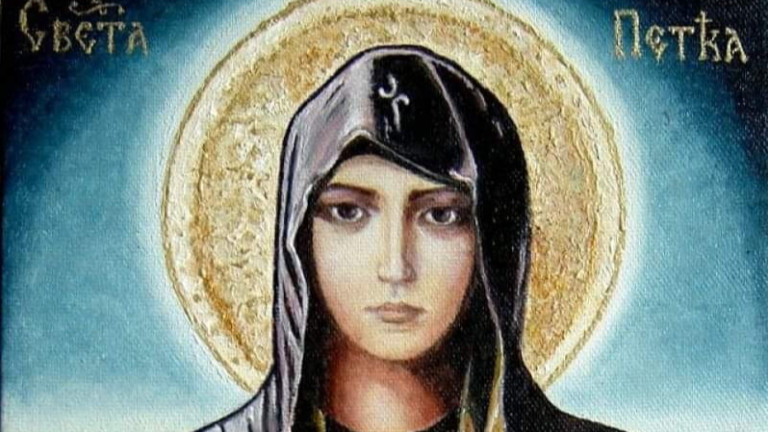From "Once upon a time - manners and worldview of the Bulgarians"
The people say that Saint Petka leads the holidays. Family celebrations begin with this holiday. They call them "saint", "holy", "service", "meal", "glory", "record", "writing" or "vicar". A sacrificial offering is carried, which is consecrated in the church, and ritual breads called "bogovitsa" are kneaded.
With Petkovden, Bulgarians celebrate the onset of winter. The period between Dimitrovden and Petkovden is the time when the farmers pay their ratai, shepherds, and day laborers. At this time, domestic animals are also fertilized, which is known as "murdering" or "sheep wedding". Women should not sew or knit, wash or knead on this day, so that healthy cattle are born. After fertilization, they knead cakes, which they distribute among themselves around the village.
Around the holiday dedicated to St. Five women have an essential role. Mainly in Thrace they perform various sacrifices, on the Monday or Saturday before the feast, sometimes after Pentecost, until Archangelov's Day. They are called "Chicken Church", "Lord's Church", "Lord's Church", "God's Spirit", "For Aunt's Health", "Good Church" or "Deputy". Householders must slaughter black hens and take them to a special place outside the village that is considered sacred - a high mound, a chapel, a votive shrine, a stone cross, a healing spring or ayazmo. Sometimes the hens are slaughtered together by an old woman or a small boy, trying to get the blood to run out in the same place. The heads are lined up side by side in the direction of the sunrise. The ritual cake is mixed with a little blood from the hens, consecrated in the church and distributed among the women present. The Kurban is communal, it is prepared with rice or cabbage, and the table is directly on the ground. With this ritual act, women express their respect to the forces of nature and to the souls of the deceased - loved ones and saints, on whom earthly goods depend.
Lean dishes are also prepared, mainly beans, which are again boiled in a common pot and, together with some of the breads smeared with honey, are left at the crossroads around the village. This food is for the "aunties", the "Vidiafki", the "Svetenki", "sweet and honey" (that's what they called the diseases - Grandmother Sharka, epilepsy, plague), and the wild ones. And in Sakar, these rituals are aimed at appeasing the dragons that protect the land from evil halls, from hail and epidemics.
Petkovden is the beginning of a period of twelve days, which for Bulgarians have a magical meaning and are associated with many prohibitions. Women should not spin, weave or pull wool, nor cut and sew clothes for their family. If a man wears a garment that has been prepared during this period, wolves will attack him and his flocks and may die.
And the church on this day honors the memory of Venerable Paraskeva or Petka Bulgarska. She was born in the Thracian city of Epivat in the 13th century in a family of Bulgarians. The city is located on the Sea of Marmara. After the death of her parents, Petka gave away their property to the poor, and she herself retired to a temple in Irakli and devoted herself to the service of God. After five years, she undertook a journey to the holy places, worshiped at the Holy Sepulcher in Palestine, and then settled in the Jordanian desert. Having lived to a ripe old age, she returned to her native city, where she died. Tsar Ivan Asen took the relics of the saint to Tarnovgrad in 1238. When the Ottoman Turks seized our lands, the Bulgarians took the relics first to Vidin and then to Belgrade. Today we can worship them in Romania, in the city of Iași.
© 2023 Iliana Dechkova

